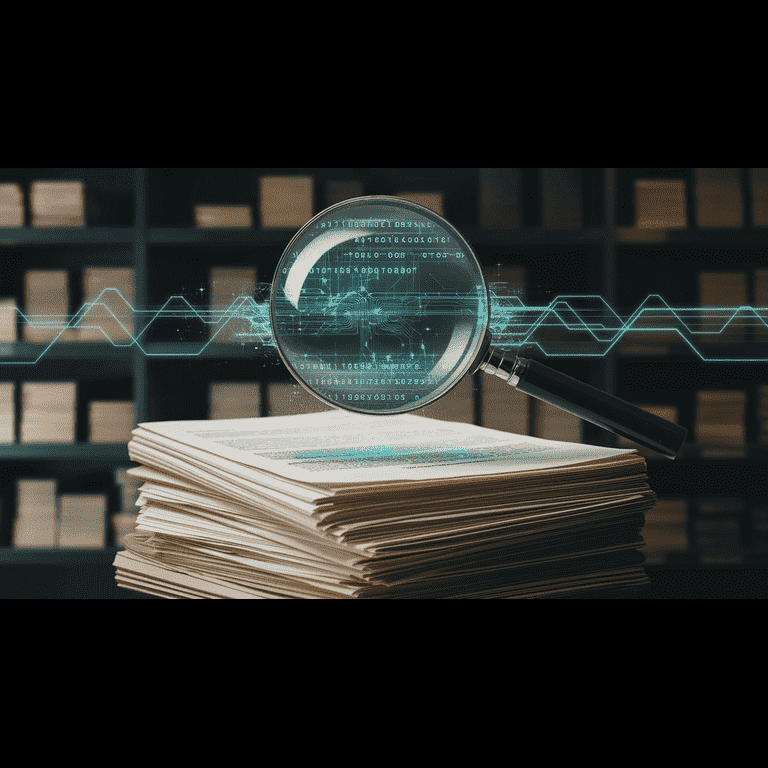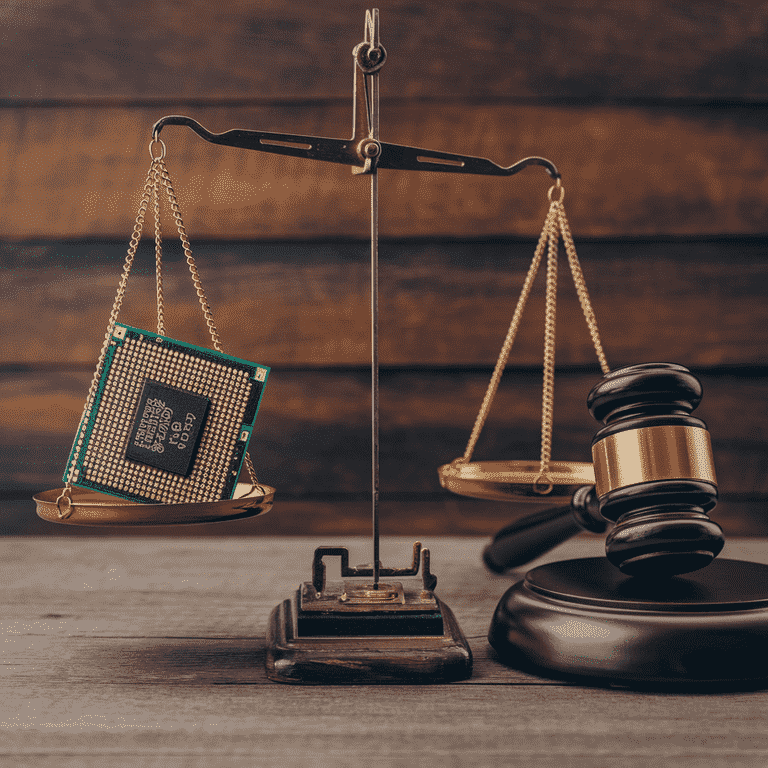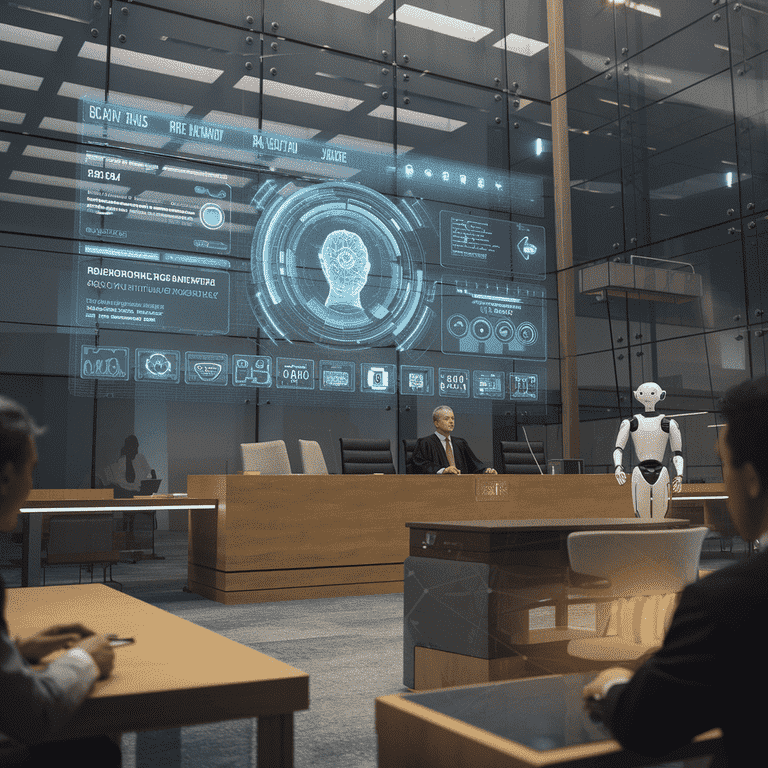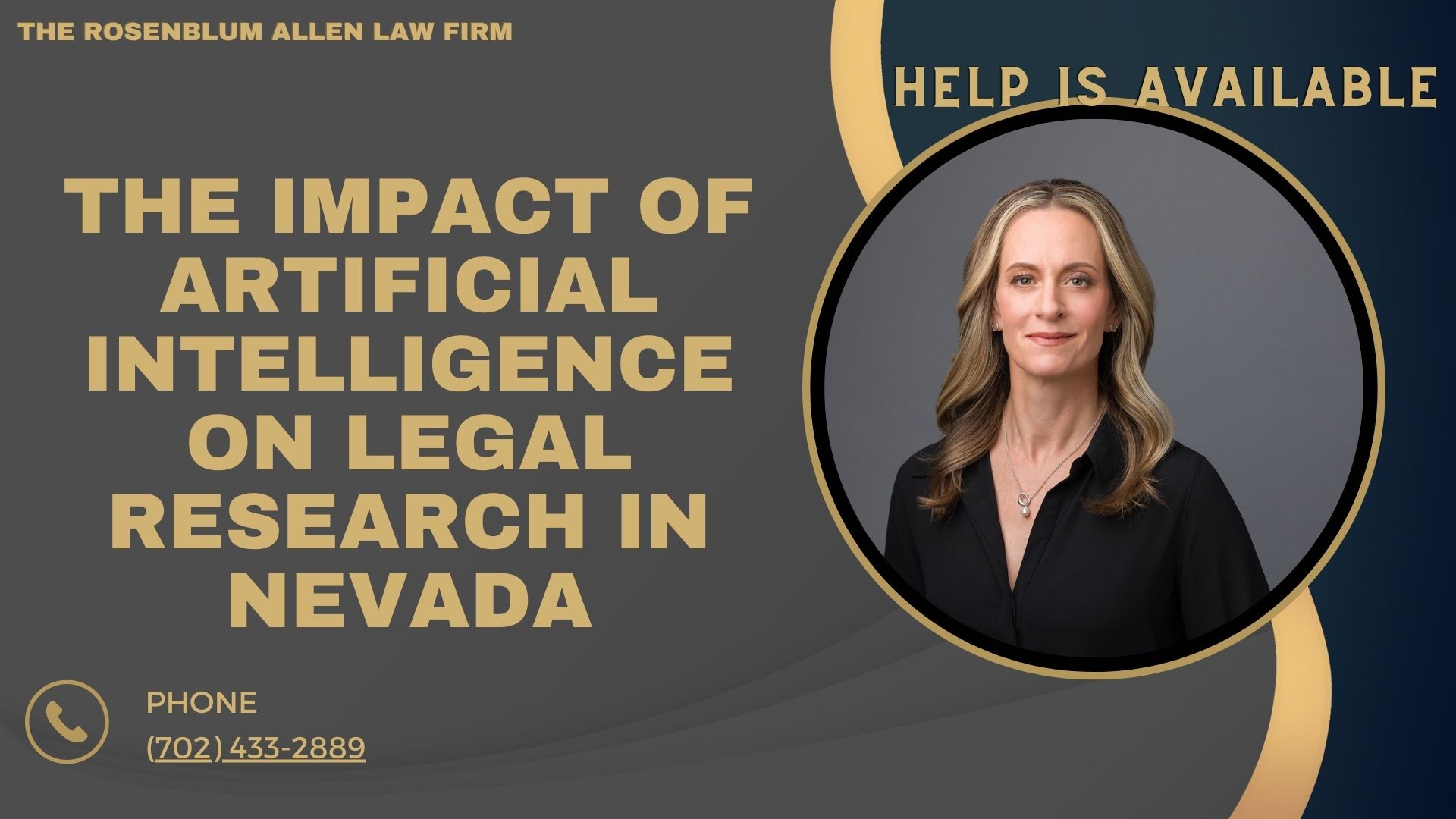Artificial Intelligence (A.I.) is revolutionizing the legal industry, particularly in legal research. In Nevada, this technological advancement is reshaping how lawyers approach case preparation and analysis.
Definition of A.I. and machine learning in law
A.I., in law, refers to using intelligent computer systems to perform tasks that typically require human intelligence. These tasks include analyzing large volumes of legal documents, predicting case outcomes, and providing insights based on historical data. Machine learning, a subset of A.I., involves algorithms that improve automatically through experience. In the legal context, this means systems that can learn from past cases and decisions to provide more accurate and relevant results.
The current state of legal technology in Nevada
- Nevada’s legal landscape is rapidly evolving with the adoption of AI-powered tools. Law firms nationwide increasingly incorporate these technologies to streamline their research processes and gain a competitive edge. Some key developments include implementing AI-powered legal research platforms in major law firms.
- Increased focus on legal tech education in Nevada law schools
- Growing number of legal tech startups in the state
Evolution of Legal Research
The journey from traditional legal research methods to AI-powered solutions has been transformative. Let’s explore this evolution:
Traditional methods
- In the past, legal research was a time-consuming process that involved Manual searching through physical law books and case reports.
- Relying heavily on legal libraries
- Spending hours cross-referencing cases and statutes
This method was time-intensive and prone to human error and oversight.

Digital transformation
- The advent of digital databases marked the first significant shift in legal research. This phase introduced Online legal databases like LexisNexis and Westlaw.
- Digital document storage and retrieval systems
- Basic keyword search functionalities
While this digitalization improved efficiency, it still required significant human input and interpretation.
Emergence of AI-powered tools
- The latest phase in this evolution is the integration of A.I. into legal research. AI-powered tools offer Advanced natural language processing for more intuitive searches.
- Predictive analytics for case outcome forecasting
- Automated document analysis and summarization
These tools are not just faster; they’re smarter, learning from each interaction to provide more accurate and relevant results.
A.I. Legal Research Tools
Various AI-powered tools have transformed the legal research landscape in Nevada. These platforms are changing the game for lawyers across the Silver State.
Popular platforms used in Nevada
- Several A.I. legal research tools have gained traction in Nevada: LexisNexis Lexis+: This platform uses A.I. to provide more accurate search results and data-driven insights.
- Westlaw Edge: Known for its advanced analytics and AI-driven research recommendations.
- ROSS Intelligence: Specializes in natural language processing for legal research.
- Casetext CARA A.I.: Offers AI-powered brief analysis and case law research.
Key features and capabilities
- These A.I. tools come packed with features that make a lawyer’s life easier: Natural Language Processing: Say goodbye to complex Boolean searches. Just ask questions in plain English.
- Predictive Analytics: Get insights on how judges might rule based on historical data.
- Automated Brief Analysis: Upload a brief and get relevant cases and statutes in seconds.
- Visual Search Results: See relationships between cases with interactive visualizations.
Benefits of A.I. in Legal Research
The advantages of A.I. in legal research are hard to ignore. Let’s examine how it’s making life easier for Nevada’s legal professionals.
Improved efficiency and time-saving
- Gone are the days of spending hours in dusty law libraries. A.I. tools are like having a super-fast, tireless research assistant. They can Scan thousands of documents in seconds.
- Provide relevant case law instantly.
- Automate repetitive tasks like citation checking.
This efficiency isn’t just about speed – it’s about freeing lawyers to focus on higher-value tasks like strategy and client interaction.

Enhanced accuracy in case preparation
- A.I. doesn’t get tired and doesn’t overlook details, leading to a more comprehensive case analysis.
- Reduced risk of missing crucial precedents
- Identification of obscure but relevant cases
Never worry about missing that critical case that could make or break your argument. That’s the power of A.I. in legal research.
Cost-effectiveness for law firms
- While the initial investment in A.I. tools might seem steep, the long-term savings are significant: Reduced billable hours spent on research.
- Lower risk of costly errors
- Ability to take on more cases with the same staff
This levels the playing field for smaller firms in Nevada, allowing them to compete with larger, resource-rich firms.
Applications of A.I. Legal Research in Nevada
AI is not just a fancy tool; it’s transforming legal work in the Silver State. Let’s explore some real-world applications.
Case law analysis
- A.I. is like having a super-powered legal mind at your fingertips. It can quickly identify relevant precedents
- Spot trends in judicial decisions
- Predict potential case outcomes
Imagine preparing for a complex litigation case. A.I. tools can analyze thousands of similar cases, giving you insights that might take weeks to uncover manually.
Statutory interpretation
- Nevada’s laws can be complex, but A.I. makes them easier to navigate: It can cross-reference statutes with related cases
- Highlight potential conflicts or ambiguities in the law
- Provide historical context for legislative changes
This means less time scratching your head over legal jargon and more time building solid arguments.
Contract review and due diligence
- A.I. is a game-changer for contract work: It can review contracts in minutes, not hours
- Flag potential risks or unusual clauses
- Ensure compliance with Nevada-specific regulations
A.I. can dramatically speed up the due diligence process for Nevada businesses involved in mergers or acquisitions.

Challenges and Considerations
While A.I. in legal research is exciting, it has its challenges. Let’s examine some of them.
Ethical implications
- A.I. raises tricky ethical questions: Can we trust A.I. to make fair and unbiased decisions?
- How do we ensure A.I. doesn’t perpetuate existing biases in the legal system?
- What happens if A.I. makes a mistake? Who’s responsible?
These aren’t just academic questions. They have real-world implications for Nevada’s legal professionals and their clients.
Data privacy and security concerns
- In the age of data breaches, security is paramount: How do we protect sensitive client information in A.I. systems?
- What if hackers gain access to AI-powered legal databases?
- How do we ensure compliance with data protection laws?
Nevada law firms must be vigilant about these issues as they adopt A.I. technologies.
Adapting to new technologies
- Change isn’t always easy, especially in a traditional field like law: Some lawyers may resist adopting new A.I. tools
- There’s a learning curve to using A.I. effectively
- Firms need to invest in training and infrastructure
But remember, the horse-and-buggy lawyers had to adapt to automobiles, too. It’s all part of staying competitive in a changing world.
Impact on Legal Professionals
A.I. is shaking things up in Nevada’s legal world. Let’s see how it’s affecting the folks in suits and robes.
Changing roles of lawyers and paralegals
- The legal job landscape is shifting, like dunes in the Nevada desert: Lawyers are becoming more like strategic advisors than research machines.
- Paralegals are evolving into tech-savvy data analysts.
- New roles are emerging, like legal technologists and A.I. specialists.
It’s not about replacing humans but enhancing what they can do. Think Iron Man suit, not Terminator.
Skills required in the AI-driven legal landscape
To thrive in this brave new world, legal pros need some new tricks up their sleeves:
- Tech-savviness: Understanding A.I. isn’t just for the I.T. crowd anymore.
- Data analysis: Being able to interpret AI-generated insights is crucial
- Adaptability: The only constant is change, so flexibility is key
- Critical thinking: A.I. provides information, but humans still need to make judgments
- Emotional intelligence: As A.I. handles more routine tasks, people skills become even more valuable
Remember, A.I. is a tool, not a replacement. The most successful legal professionals will be those who learn to dance with the robots, not fight them.
Emerging trends in automated legal analysis
Some remarkable developments on the horizon:
- Predictive justice: A.I. that can forecast court decisions with scary accuracy
- Virtual legal assistants: Think Siri or Alexa, but for law
- Blockchain for smart contracts: Self-executing contracts that could revolutionize business law
These aren’t sci-fi fantasies. They’re already in development and could hit Nevada law firms sooner than you think.

Potential developments in machine learning law
- Machine learning is getting smarter by the day. Here’s what we might see: A.I. that can draft essential legal documents autonomously
- Systems that can identify potential legal issues in business operations before they become problems
- AI-powered dispute resolution for simple cases, freeing up courts for more complex matters
The possibilities are as vast as the Nevada sky. But remember, with great power comes great responsibility. Nevada’s legal community must ensure that these tools are used ethically and effectively.

Breaking It All Down
Summary of A.I.’s impact on legal research
- A.I. has hit Nevada’s legal scene like a jackpot on a slot machine: It’s supercharging research speed and accuracy.
- Leveling the playing field for smaller firms
- Changing the very nature of legal work
But it’s not all smooth sailing. There are challenges to navigate, from ethical concerns to the need for new skills.
Outlook for the Nevada legal industry
- The future looks bright but different: We’ll likely see more tech-savvy, strategically focused lawyers.
- Smaller firms can punch above their weight.
- The legal system could become more efficient and accessible.
One thing’s for sure: the Nevada legal landscape is changing faster than a Las Vegas skyline. Those who adapt will thrive. Those who don’t might find themselves folding their hand. Ultimately, A.I. in legal research isn’t about replacing the human touch. It’s about augmenting it, allowing Nevada’s legal eagles to soar. The game is changing, and it’s an exciting time to be in the law in the Silver State!

Frequently Asked Questions
Q: How does AI legal research impact the cost of legal services for clients in Nevada?
A: AI legal research can potentially reduce client costs by increasing efficiency and reducing billable hours spent on research. However, the impact may vary depending on the firm and the case’s complexity.
Q: Are there any Nevada-specific regulations governing the use of AI in legal practice?
A: Currently, no specific regulations in Nevada govern the use of AI in legal practice. However, when using AI tools, lawyers must adhere to general ethical guidelines and data protection laws.
Q: Can AI legal research tools be used in Nevada courts?
A: While AI tools can be used for research and case preparation, the admissibility of AI-generated analysis in court may vary. It’s always best to consult with a specific court or judge regarding using AI-generated materials.
Q: How are Nevada law schools preparing students for AI in legal research?
A: Many Nevada law schools are incorporating legal technology courses into their curricula, including training on AI-powered research tools. However, the extent of this preparation can vary between institutions.
Q: Is AI legal research more suitable for some Nevada law regions?
A: While AI can be beneficial in most areas of law, it’s advantageous in data-intensive fields like contract law, intellectual property, and regulatory compliance. However, its applicability is expanding to other areas as well.
Q: How does AI handle Nevada-specific laws and regulations?
A: Advanced AI legal research tools are designed to incorporate state-specific laws and regulations, including those of Nevada. However, it’s always essential for legal professionals to verify AI-generated results against current Nevada statutes and case law.
Q: What happens if an AI legal research tool makes a mistake?
A: Ultimately, the responsibility for legal advice and decisions rests with the human lawyer. AI tools are meant to assist, not replace, legal professionals. Lawyers should always verify AI-generated results and use their professional judgment.
Q: How can small law firms in Nevada compete with larger firms using expensive AI tools?
A: Many AI legal research tools offer scalable pricing models accessible to smaller firms. Additionally, the efficiency gained from these tools can help smaller firms compete more effectively with larger ones.

Glossary

Additional Resources for You from The Rosenblum Allen Law Firm.
As a reminder, our lead attorney, Molly Rosenblum Allen, Esq., has created several valuable resources to assist you in your time of need.
Criminal Defense Attorneys: Comprehensive legal representation for various criminal charges in Las Vegas.
Las Vegas DUI Lawyer: Specialized defense for DUI cases, offering strategies to minimize penalties and protect your rights.
Domestic Violence Lawyer Las Vegas: Effective legal support for those facing domestic violence charges, focusing on fair treatment and resolution.
Drug Possession Lawyer: Dedicated defense for drug-related charges, aiming to reduce or dismiss charges when possible.
Sex Crimes Attorney: Sensitive and thorough representation for those accused of sex-related offenses.
CPS Defense Attorney: Specialized assistance in cases involving Child Protective Services, protecting parental rights and family integrity.
Misdemeanor Lawyer: Legal guidance for less severe offenses, focusing on minimizing impact on your record and life.
Las Vegas Warrant Defense Attorney: Help with resolving outstanding warrants and navigating the legal process to clear your name.
Las Vegas Probation Violation Attorney: Assistance in addressing probation violations and negotiating with the court system.
Theft Crime Defense Lawyer: Strategic defense for various theft charges, from shoplifting to grand larceny.
Kidnapping Lawyers: Effective representation for the complex and serious charge of kidnapping.
Juvenile Defense Lawyers: Specialized defense for minors, focusing on rehabilitation and protecting their future.
Firearms Lawyer Las Vegas: Legal support for gun-related charges, ensuring your rights are protected under Nevada law.

Offsite Resources for You
American Telemedicine Association: https://www.americantelemed.org/
A leading resource for telemedicine advocacy, research, and industry standards.
Center for Connected Health Policy: https://www.cchpca.org/
Provides comprehensive information on telehealth laws and policies across the United States.
Health Care Compliance Association: https://www.hcca-info.org/
Offers resources and training on healthcare compliance, including telehealth regulations.
American Health Law Association: https://www.americanhealthlaw.org/
Provides legal resources and education on various aspects of health law, including telemedicine.
National Consortium of Telehealth Resource Centers: https://www.telehealthresourcecenter.org/
Offers expertise and support for implementing telehealth programs.
Healthcare Information and Management Systems Society: https://www.himss.org/
Provides resources on healthcare technology, including telemedicine implementation and best practices.
Federation of State Medical Boards: https://www.fsmb.org/
Offers information on medical licensing and regulation, including telemedicine policies.

A Special Message from Our Lead Attorney, Molly Rosenblum Allen, Esq

Thank you for taking the time to read through these resources. I hope you found the information helpful as you navigate your legal concerns. If you have any questions or need personalized guidance, my team and I are here to assist you. Don’t hesitate to reach out to us at (702) 433-2889. We’re ready to help you get the ball rolling on your situation. We look forward to speaking with you soon.
Warm regards,
Molly Rosenblum Allen, Esq.
The Rosenblum Allen Law Firm






